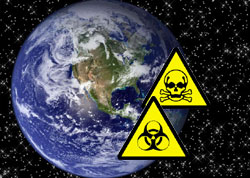There is a major risk to the health of the people of the UK because of Boris Johnson’s pursuance of an ultra-hard Brexit, Chem Trust and other campaigners are warning.
 The UK will be powerless to prevent potentially dangerous chemicals being used in everyday goods and will become “a dumping ground” for products linked to cancer, thyroid disease, hormone disruption and developmental problems because the prime minister insists on pulling out of the European Chemicals Agency (ECHA) and its database known as Reach.
The UK will be powerless to prevent potentially dangerous chemicals being used in everyday goods and will become “a dumping ground” for products linked to cancer, thyroid disease, hormone disruption and developmental problems because the prime minister insists on pulling out of the European Chemicals Agency (ECHA) and its database known as Reach.
The alternative to this would mean the UK having to re-invent the wheel when it comes to controlling hazardous chemicals itself in a process which will take many years.
The UK does not have the resources or experience of developing and providing a similar system of protecting the nation from the above hazards and will simply align itself to standards of the USA in order to ensure a trades deal with them.
The disdain for the European Court of Justice and it having any say whatsoever in anything the UK Government does is the cause of the ultimate risk to REACH.
Meanwhile after January 2021 when the UK ends the transition period and is fully out of the EU, manufacturers will be able to successfully challenge attempts to exclude chemicals banned in the EU. Everything from food and drink packaging and paints to furniture, carpets, clothing and children’s toys, utilising the strategies of the industry in the USA.
 Dr Michael Warhurst, executive director of Chem Trust campaigning charity, said:
Dr Michael Warhurst, executive director of Chem Trust campaigning charity, said:
“We risk spending most of our time trying to install a database with no data on it – and not having time to develop any new controls.”
Whilst Libby Peake, of the Green Alliance think tank warns:
“If we don’t have access to the safety data then the government could be challenged in the courts over decisions and it could lose."
We are in this position because Boris Johnson ditched Theresa May’s plan for “associate membership” of EU agencies, including REACH. The fact is that to remain as part of the European Chemicals Agency (ECHA), it would involve following all decisions on chemicals in Reach, without a vote, and oversight by the European Court of Justice (ECJ) which are both anathema to the PM and his right-wing bloc of EU hating MPs who have been campaigning for years to take the country out of the EU and with a prime minister pledging “no alignment”.
In its aims for an EU trade deal, the UK is now arguing for “separate regulatory requirements” – which would rule out access to the database or the exchange of confidential business information.
 But Chem Trust has branded the decision “a risk to public health and the environment”, highlighting the types of chemicals the EU has banned – or is seeking to ban – including:
But Chem Trust has branded the decision “a risk to public health and the environment”, highlighting the types of chemicals the EU has banned – or is seeking to ban – including:
* Bisphenols – known to disrupt the body’s hormone system, some are banned from use in babies’ bottles and infant cups and, soon, from thermal paper till receipts. However, firms are starting to use other bisphenols “that raise similar concerns about toxicity”, the group says.
* Per- and polyfluoroalkyl substances (PFAS) – used in non-stick pans, waterproof fabrics, food packaging and cosmetics, they have been linked to cancers, thyroid disease, obesity and reproductive problems, but only two of 4,000 chemicals in the group have been banned so far.
* Phthalates – added to plastics to increase durability, they are found in furnishings, flooring, clothing, paint and some toys. With pregnant women and children most vulnerable – exposure in the womb has been linked to poor reproductive organ development in boys, early onset of female puberty, and delayed language development – they are partly restricted in the EU.
The UK expects to spend £13m a year on its regulator, employing 35 to 40 staff, but Reach boasts 589 staff and a budget topping €100m (£89m) – yet has still failed to vet all chemicals after more than a decade’s work.
Dr Warhurst warned:
“There is a big difference between being able, theoretically, to control chemicals and actually being able to do it, with much less data, fewer people – and perhaps under pressure from a US trade deal. These chemical companies have a record of going to court when restrictions are imposed.”
Ms Peake added:
“For two years at least after the transition period, we will no longer have access to the EU’s database and, therefore, access to the safety data. During that period, there is a risk that companies will try to use chemicals in the UK that have been banned or restricted at an EU level, on the grounds that we don’t have the background safety data to justify a decision.”
Source: Chem Trust / Green Alliance / The Independent